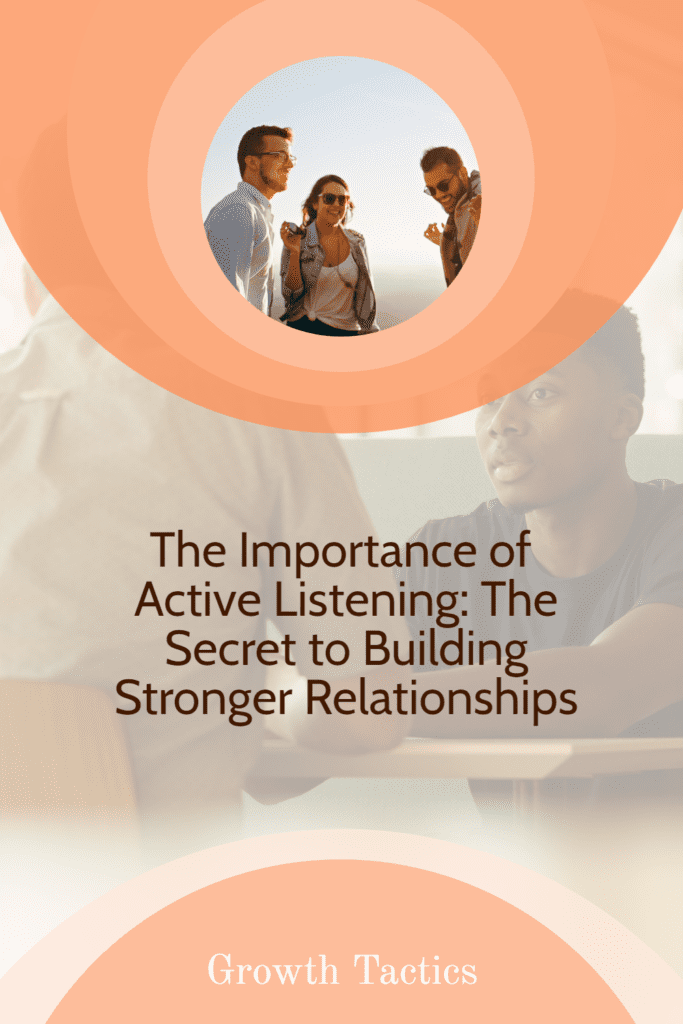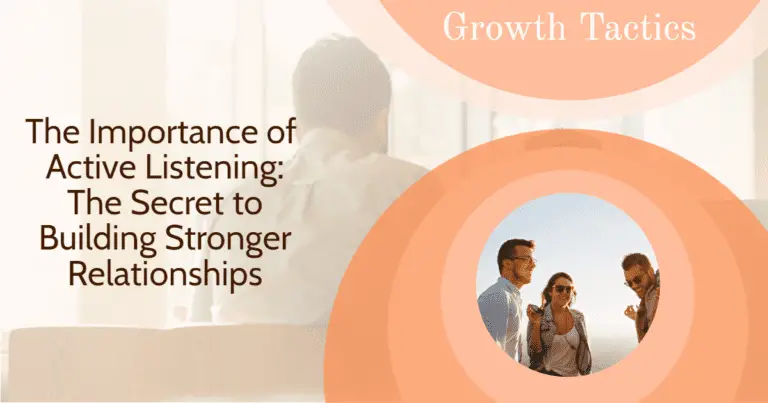In a world where communication plays a vital role in our everyday lives, active listening has emerged as a crucial skill that fosters deeper connections and understanding. Active listening means processing and responding to the speaker’s underlying message, not just their words.
By focusing on active listening, you embark on a journey of self-improvement, strengthening your relationships and enhancing your overall communication abilities.
In this blog post, we’ll delve into the world of active listening, uncovering its importance in personal growth and providing practical tips to help you become a better listener and, ultimately, a better person.
Jump To Section
The Fundamentals of Active Listening

Definition of active listening
Active listening is a communication skill that goes beyond merely hearing the words spoken by others. It is an intentional, fully-engaged process in which an individual attentively listens to the speaker, absorbs the information, and responds thoughtfully to demonstrate understanding and empathy.
Active listening requires interpreting both verbal and non-verbal cues while setting aside biases. By doing so, the listener creates a safe and supportive space for open and honest communication, fostering mutual respect and trust. In essence, active listening is the cornerstone of effective communication, paving the way for stronger connections and improved collaboration.
Key components of active listening
The key components of active listening that contribute to effective communication are:
- Paying attention: Fully focusing on the speaker and giving them your undivided physical and mental attention. This involves maintaining eye contact, having open body language, and minimizing distractions to demonstrate a genuine interest in what the speaker is saying.
- Reflecting: Demonstrating empathy and understanding by acknowledging the speaker’s emotions and feelings. Reflecting helps the listener process the information, showing that they are engaged in the conversation and genuinely care about the speaker’s thoughts and emotions.
- Clarifying: Asking open-ended questions or seeking further information to avoid misunderstandings and misinterpretations. Clarifying ensures that the listener has a clear and accurate understanding of the speaker’s message, fostering effective communication.
- Summarizing: Restate the main points of the conversation or message in your own words to confirm your understanding. Summarizing not only helps the listener retain the information but also provides the speaker with an opportunity to correct any misconceptions or add further details.
- Sharing: Providing feedback, offering insights, or expressing your own thoughts and feelings in response to the speaker’s message. Sharing helps to establish two-way communication, enabling both parties to learn from each other and build a stronger connection.
Tips and Techniques for Practicing Active Listening

To become an effective active listener, it is crucial to adopt specific strategies and techniques that facilitate genuine engagement and understanding. Below are several tips and techniques to help you master the art of active listening:
Creating a conducive environment
Setting the stage for effective communication begins with creating a comfortable and distraction-free environment. Choose a quiet and well-lit space, maintain eye contact, and ensure that both you and the speaker feel at ease. A conducive environment fosters openness and trust, making it easier to engage in meaningful conversations.
Adopting an open body language
Your non-verbal cues significantly impact the effectiveness of active listening. Adopt a relaxed, open posture, maintain eye contact, and use occasional nods or affirmative gestures to signal your engagement. This open body language demonstrates your interest and attentiveness, encouraging the speaker to share more openly.
Developing focused attention
To fully absorb and understand the speaker’s message, it’s essential to concentrate on their words, tone, and body language. Avoid multitasking, and instead, fully immerse yourself in the conversation. Developing focused attention not only helps you process the information but also signals to the speaker that you truly value their thoughts and opinions.
Asking open-ended questions
To ensure clarity and deepen your understanding, ask open-ended questions that encourage elaboration and exploration. These questions demonstrate your genuine interest in the speaker’s perspective and provide an opportunity to delve further into the topic.
For more insights on the art of asking open-ended questions, you can refer to this comprehensive guide by SkillsYouNeed, which offers examples and tips for crafting effective open-ended questions.
Practicing reflective listening
Reflective listening involves paraphrasing or summarizing the speaker’s message to confirm your understanding and demonstrate empathy. This technique allows you to process the information, offer feedback, and provide an opportunity for the speaker to clarify or expand upon their thoughts.
Avoiding distractions and interruptions
Resist the urge to interrupt the speaker or become distracted by external factors. Instead, focus on listening attentively and allowing the speaker to finish their thoughts before responding. You create an environment of respect and understanding by avoiding distractions and interruptions, fostering more effective communication.
Benefits of Active Listening for Self-Improvement
Active listening offers a plethora of benefits that contribute significantly to personal growth and self-improvement. By honing this essential skill, you can unlock a myriad of opportunities for personal and professional development. Let’s discuss a few of these benefits:
- Enhanced understanding: Active listening allows you to gain a deeper comprehension of others’ thoughts, emotions, and perspectives. This understanding fosters empathy, enabling you to relate to others more effectively and appreciate their unique experiences.
- Conflict resolution: By actively listening to others, you can identify and address the root causes of disagreements and misunderstandings, facilitating constructive conversations and promoting problem-solving.
- Stronger relationships: Active listening fosters trust, respect, and rapport, which serve as the foundation for building and maintaining healthy personal and professional relationships.
- Improved communication skills: Practicing active listening refines your ability to express yourself clearly and concisely, ensuring that your own message is accurately received and understood by others.
- Personal growth: Active listening encourages reflection, self-awareness, and introspection, ultimately leading to a better understanding of your own thoughts, emotions, and values. This self-awareness allows you to make informed decisions and adapt your behavior for continued personal growth.
In summary, active listening is a powerful tool for self-improvement, equipping you with the skills and insights necessary to navigate the complexities of human interaction and excel in both personal and professional realms.
Common Barriers and Solutions
Even with the best intentions, several barriers can hinder effective active listening. Recognizing these common barriers and implementing practical solutions can enhance your ability to listen actively and improve your communication skills.
1. Distractions
Barrier: Distractions, both external (noise, interruptions) and internal (own thoughts), can prevent us from fully focusing on the speaker.
Solution: Create a conducive environment by minimizing external distractions. Find a quiet space, turn off mobile devices, and maintain eye contact. Combat internal distractions by practicing mindfulness and staying present in the moment.
2. Preconceptions and Biases
Barrier: Preconceptions and biases can cloud our judgment, causing us to interpret messages through a biased lens rather than truly understanding the speaker’s perspective.
Solution: Approach each conversation with an open mind. Acknowledge and set aside preconceptions and biases. Focus on listening without judgment and seek to understand the speaker’s point of view fully before forming an opinion.
3. Emotional Reactions
Barrier: Strong emotional reactions can interfere with our ability to listen objectively and empathetically.
Solution: Practice emotional regulation by recognizing your triggers and taking deep breaths or pausing before responding. If emotions are too intense, it might be helpful to temporarily step back from the conversation and return to it once you feel more composed.
4. Interruptions
Barrier: Interrupting the speaker can disrupt their train of thought and hinder effective communication.
Solution: Resist the urge to interrupt. Practice patience and let the speaker finish their points before responding. Use active listening techniques like nodding or making affirmative noise to show you are engaged without speaking over them.
5. Multitasking
Barrier: Trying to multitask during conversations can lead to missing important details and signals.
Solution: Prioritize the conversation by giving it your full attention. Set aside other tasks and focus solely on the speaker. This dedication not only improves your listening but also shows respect to the speaker.
6. Lack of Interest
Barrier: A lack of interest in the topic or speaker can result in disengaged and inattentive listening.
Solution: Find aspects of the conversation that you can connect with or find interesting. Ask open-ended questions to keep the dialogue engaging, demonstrating your willingness to understand more deeply.
7. Language and Cultural Differences
Barrier: Language barriers or cultural differences can lead to misunderstandings and misinterpretations.
Solution: Be patient and open-minded. Use clarifying questions to ensure understanding and avoid assumptions. If necessary, repeat or rephrase your points and encourage the speaker to do the same to facilitate clearer communication.
By being aware of these barriers and actively working to counter them, you can foster more effective and empathetic listening. This, in turn, enhances communication and strengthens your relationships, both personally and professionally.
Active Listening in Various Life Scenarios

Mastering active listening skills can vastly improve our experiences in various life scenarios, leading to more fulfilling relationships, heightened personal growth, and greater success in all aspects of life.
Personal relationships
Personal relationships are the foundation of our social lives, and active listening plays a crucial role in nurturing and maintaining these bonds. In friendships, practicing active listening can significantly strengthen connections and foster trust.
By genuinely engaging with our friends and showing empathy toward their experiences, we demonstrate that we value and care for them. This attentiveness also enables us to offer relevant and meaningful advice, support, and encouragement, ultimately deepening the bond between friends. As a result, active listening serves as a vital ingredient in cultivating long-lasting, fulfilling friendships.
Similarly, active listening can greatly enhance family relationships. Given the complexity and emotional depth of family dynamics, effective communication is paramount. Active listening with family fosters understanding, resolves conflicts, and promotes healthy emotional expression.
Furthermore, active listening fosters a sense of validation and support, contributing to the emotional well-being of family members and strengthening familial bonds. In essence, incorporating active listening into our daily interactions with family members paves the way for more harmonious and meaningful connections.
Professional settings
In professional settings, active listening plays a pivotal role in enhancing teamwork and collaboration among colleagues. By actively engaging with team members, we demonstrate our commitment to understanding their perspectives and ideas, which helps to foster a sense of trust and respect within the group.
This open communication encourages the sharing of knowledge, facilitates effective problem-solving, and promotes a healthy exchange of feedback. Moreover, active listening can help prevent misunderstandings and conflicts, ultimately leading to a more cohesive and efficient team. In essence, incorporating active listening into workplace interactions can significantly boost teamwork, resulting in increased productivity and overall success.
Additionally, active listening is a vital skill when it comes to fostering customer satisfaction. By attentively engaging with clients and truly understanding their needs, concerns, and preferences, we can tailor our products and services to better meet their expectations.
Active listening also enables us to empathize with customers, making them feel valued and heard. This positive experience not only increases the likelihood of repeat business but also promotes positive word-of-mouth recommendations. In customer-facing roles, the ability to actively listen to and address customers’ needs can significantly bolster customer satisfaction and, ultimately, contribute to the company’s overall success.
Conflict resolution
In the realm of conflict resolution, active listening is an essential tool for mediating disagreements and finding common ground. By attentively engaging with each party involved in the conflict, a mediator can demonstrate their impartiality and create a safe space for open communication. This approach allows individuals to express their thoughts and feelings without fear of judgment or dismissal.
Active listening also helps the mediator identify the root causes of the disagreement, enabling them to guide the conflicting parties towards a mutually acceptable solution. By actively listening and validating each person’s perspective, the mediator fosters a sense of trust and cooperation, ultimately paving the way for a more effective conflict resolution process.
Moreover, active listening promotes understanding between individuals who may hold differing viewpoints or beliefs. By truly hearing and acknowledging each other’s perspectives, the conflicting parties can begin to empathize with one another and appreciate the underlying factors that contribute to their respective stances. This newfound understanding can lead to a shift in attitudes, opening up the possibility for compromise and collaboration.
In many cases, active listening can also alleviate feelings of resentment and frustration, as individuals feel heard and valued. In conclusion, the practice of active listening in conflict resolution not only mediates disagreements but also fosters a deeper understanding and connection between the parties involved, enabling the resolution of disputes in a more amicable and constructive manner.
Measuring Your Active Listening Progress
To effectively measure your active listening progress, a combination of self-assessment, seeking feedback from others, and identifying areas for improvement is essential. Begin by engaging in regular self-reflection, taking note of your listening habits, and recognizing instances where you may have faltered or excelled in active listening.
Additionally, seek feedback from friends, family, and colleagues, as their perspectives can provide valuable insights into your listening skills and areas where you may need to focus your efforts. By actively soliciting constructive criticism, you demonstrate your commitment to personal growth and the desire to become a better listener.
Finally, identify specific areas for improvement, such as maintaining eye contact, asking open-ended questions, or avoiding interruptive behavior. By consistently working on these targeted aspects of active listening, you can track your progress and witness the tangible benefits of your efforts, ultimately leading to enhanced communication and stronger connections in all aspects of life.
The Lasting Impact of Active Listening and Embracing Continuous Improvement
In conclusion, the importance of active listening cannot be overstated, as it serves as the foundation for effective communication, collaboration, and conflict resolution in both professional and personal contexts.
By attentively engaging with others and genuinely seeking to understand their perspectives, we foster trust, respect, and empathy, ultimately paving the way for stronger relationships and more successful outcomes.
As with any skill, mastery of active listening requires continuous practice and a genuine commitment to self-improvement. Therefore, it is essential to regularly self-reflect, seek feedback, and identify areas for growth.
By consciously integrating active listening into our daily interactions, we can make a lasting impact on our lives and the lives of those around us. So, let us embrace the journey of continuous improvement and strive to become better listeners, fostering deeper connections and more harmonious environments wherever we go.
Did you enjoy this article on the importance of active listening skills? Please share and subscribe below.


